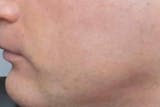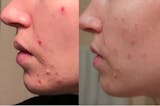The unpredictability of eczema drives stress, impacting the immune system and exacerbating symptoms.
The interconnection between mental and physical health means that improving mental health can significantly improve eczema symptoms.
The physical symptoms of eczema can vary in severity and can impact on all aspects of an individual’s life. Mild symptoms can be uncomfortable and lead to undesirable changes in the skins appearance.
Severe symptoms can be totally overwhelming, debilitating and extremely distressing to live with. The sufferer’s quality of life is affected and there are significant mental health implications.(NHS)(KIM 2011)(FIS 2012)(DAV 2011)
This page explores how mental health can be affected and how one can mitigate these negative effects.
JUMP TO SECTION:
The Physical Impact of Eczema
The physical symptoms of eczema, including dry and scaly skin, inflammation, itchiness, thickened skin, blisters, color changes, and ooze and crusting, can change the way we behave and act. If the symptoms persist long enough, the structure of the brain can change to match our new reality.(BAE 2011)
Dry, thickened, or scaly skin, for instance, can feel rough to touch and be touched.
Itchiness can vary from mildly uncomfortable to totally overwhelming, distracting from daily tasks and draining mental energy. It can result in feeling fidgety and restless and also negatively impact on sleep.
Inflammation can be hot and tender to touch and uncomfortable with high temperatures, affecting the clothes the sufferer wears, how they wash, and their level of discomfort in a warm environment.
Blisters, often occurring on feet and hands, are sensitive and uncomfortable. In severe cases, they can be so large and painful that the sufferer cannot put shoes on or wear certain clothes. It can be problematic getting the blisters wet, which affects what the sufferer can do with the affected regions.
Ooze and crusty skin can get on clothes and bedding, and it feels very uncomfortable and unpleasant. It can affect the clothes worn and increase the frequency of washing the skin and the body.
In essence, eczema symptoms can become all-encompassing, affecting every aspect of life. This includes sleep quality, attentiveness, work productivity, relationships, clothing options, and the ability to comfortably engage in exercise.
All of these factors can take a toll on mental health, reinforcing the need to address both physical and psychological aspects of eczema to break the cycle of distress and improve overall well-being.
The Psychological Impact of Eczema
There are significant psychological impacts from living with severe eczema and poor skin health. Constant discomfort from dryness, itchiness, inflammation, blistering, sensitive skin and hyper awareness to very negative sensations is exhausting.
Treatments can bring their own side effects: burning skin, wrinkles, slimy skin, rosacea and drowsiness to name a few. Expensive and time consuming treatment can add burden to normal life. These factors can increase stress levels and ultimately contribute towards burnout. (SMI 2022)
Color changes on the skin, dry flakiness and wrinkles all negatively affect how the skin looks and lead to reduced self-worth and social anxiety. Eczema can flare immediately and take a long time to heal. The fear of sometimes unavoidable and invisible triggers results in a fear of causing a flare-up.
Even triggers that can be avoided require near-constant awareness and attention which can lead to an anxiety of missing something. Even the presence of air-borne allergens can increase anxiety levels.(CAS 2018)
Living with eczema can be isolating, painful and overwhelming. It comes as no surprise then that having eczema increases the chances of developing depression and anxiety.(SCH 2020)(YAN 2017)
Depression is a normal reaction to grief which is a normal reaction to loss.(SMI 2022) In the context of eczema, this could be the loss of comfort, freedoms of feeling healthy, relationships and identity.
Typical characteristics include a loss of interest and enjoyment in ordinary things and experiences, feeling flat and unmotivated. An individual is 14% more likely to suffer from depression if they suffer from atopic eczema compared to the average.(SCH 2020)
Anxiety can be a natural response to risks and threats to your daily life (SMI 2022) and an anxious disorder is characterized by excessive fear, anxiousness or avoidance of perceived threats.(WHO 2017)
In the context of eczema, this could be the fear of triggering the symptoms to worsen, skin flaring up or avoidance of social situations due to a fear of what people may say or how they may react to your condition. An individual suffering from atopic eczema is 17% more likely to suffer from an anxiety disorder when compared to the general population.
In more severe cases of eczema, the likelihood of developing an anxious disorder increases to 26%. (SCH 2020)
As discussed in our article on the effects of stress on eczema, anxiety itself can lead to increased itch. (MIS 2018)(GAR 2013) Demotivation from depression can result in the individual struggling to implement their treatment effectively and suffer more as a consequence.
This can lead to a vicious cycle where the eczema symptoms lead to emotional stress, depression and anxiety which result in worse eczema symptoms. Therefore it is critical to look after one’s mental wellbeing to help recover from eczema.
Improving eczema symptoms can result in improved anxiety and depression metrics, as shown by one study where Dupilumab has been shown to boost mental wellbeing and quality of life within 2 weeks of initiating treatment. (COR 2020)
Breaking the Cycle: Managing Your Mental Health And Eczema
The mind-body connection is strong. Eczema can impact on your mental wellbeing and in return your mental wellbeing can impact on your skin health. Therefore it is important to treat your mental health as seriously as the physical symptoms of eczema.
It’s natural to experience bad feelings, especially when there is a justified reason, such as poor health. Listen to what your feelings are saying and do only what you feel you can do.
Keep talking to your family and friends following the techniques listed on this site and time will help to heal you. Stoic Philosophy can provide grounding as it teaches the development of self-control and fortitude as a means of overcoming destructive emotions, check out this podcast to learn more.(CHA 2021)
Mindfulness
Mindfulness is a practice of pausing when we notice unwanted feelings, taking a moment to identify the feeling, and then think on what may have triggered that feeling.(CHA 2021) By identifying your feelings, you can pinpoint the potential stress triggers and work on finding solutions.(MON 2016)
Super simple right? You are stressed out, panicking, and the advice is: just will your way out of it.
We have been there and, no, it is not that simple. And no, we do not expect you to change right away.
But it is possible and we do believe in you.
Like most other things, it is a matter of practice. Meditation can help build your mindfulness muscles so that when you are faced with a crisis, you will have the strength to take a pause and find the trigger.
Similar to dealing with eczema and discussed in our article on the effects of stress on eczema, there are three steps to managing your mental wellbeing: awareness, triggers and treatment. To build self-awareness, take time to check in to how you feel in the present by practicing mindfulness.(MON 2016)
The potential triggers of depression and anxiety in the context of eczema have already been discussed earlier in this page. Take some time to explore how your feelings could indicate what the trigger is.(CHA 2021) This can help to target your treatment.
Mindfulness technique
Take time out - give yourself a moment to collect your thoughts, practice mindfulness and be present
If you find yourself in a bad place, take some time to recognize what emotions you are feeling and understand the cause.(CHA 2021)
Given the circumstances, it’s likely that your skin has something to do with it. Perhaps it is a recent flare up or an unknown trigger.
Meditation
Meditation can improve the brain’s resilience to stress and anxiety inducing situations, and help us identify triggering negative thoughts that lead to a physical reaction, which lead to more negative thoughts (aka, “spiraling”).
Movies may have portrayed meditation as sitting, saying “om”, and being irritated when the youthful applicant interrupts. However practical meditation is the act of training the higher order brain functions responsible for awareness, concentration, and decision making.
It is about being a better you.
Often meditators will think on their core values and think about how they can manifest outcomes related to those core values. For example, a meditating parent might think of a core value like, “I want my children to have success”.
They would then ask themselves what success is and then think on the events of the previous day. With no agenda to those thoughts, they simply watch the movie of the previous day. They would acknowledge any thoughts which arise and let them move on.
Often, insights will come forth that are important to act on. If you have ever experienced a key insight while walking the dog or taking a shower, the effect is similar. And you have now trained your brain for this - during non-meditation periods, your brain will be better able to notice your thoughts and change them and change the outcomes.
To meditate, many people sit on the floor with legs crossed (just like in the movies) but you can just as easily lie down. The position you choose is up to you, but the key is to limit outside stimulus like movement and sounds.
Notice how you are sitting, how you are feeling and your breathing. Remember to be kind to your thoughts. Do this for a set amount of time and gently arouse yourself again once the time is up.
If you are struggling with solo meditation, there are various sources of guided meditation.
Talk
Quality relationships fulfill fundamental human needs and boost happiness.(CHA 2021)(SMI 2022) Talking to close family and friends can be a therapeutic activity. There is a psychological effect where your thoughts will have more emotional effect when kept inside. Once you put the thoughts into words, often the challenges of those thoughts will seem smaller.
One of the keys to success here is to try to limit the expression of the thoughts to the facts of the thoughts, and limit the emotional expression of them. By doing so with a companion, you have the opportunity to associate new feelings with those thoughts.
Your friends and family want to help. Give them a chance!
Exercise
Working out or engaging in physical activities can release feel-good endorphins that improve your mood and it can protect you long-term from new challenges.(CHA 2020)(SMI 2021) Check out some of our tips on exercising with eczema.
Combine this with exercising socially and in nature to compound the benefits. Being in nature can induce the feeling of awe which can help to put things into perspective.(SMI 2021)
Be Solution Oriented
Once you have acknowledged your negative feelings and explored the potential triggers, it can be helpful to try to move on from the negatives. Instead, focus your energy on what solutions are accessible and achievable. Ask yourself: “What can I do about this?”
Here are some examples:
"I feel fidgety and frustrated that my skin is so uncomfortable and I’m scared that I might be allergic to something I’m eating." Perhaps it is time to take some allergy tests to investigate allergies as a trigger. Or perhaps it is time to start a food diary to compare skin symptoms to diet (see our tracking resources for how)
"I feel overwhelmed: my skin is awful, work is busy and I can’t find my eczema cream." Perhaps getting organized, cleaning up and sorting my medications out will help to declutter my mind and I’ll find the creams I need. Or perhaps it’s time to take some sick-leave from work and rest
"I feel flat and sad, my eczema has stopped me being able to go swimming which is a big part of my identity." Perhaps it is time to meditate, perhaps I should write down three things that I can still do and I am grateful for.
When you know what is causing the feelings, ask yourself: "What can I do about it?"
Perhaps it’s time to implement a more drastic change in diet. Perhaps it’s the motivation you need to start tracking your symptoms and triggers to to narrow in on your condition.
Breath
Breathing is perhaps the most accessible and powerful tool to reduce anxiety and stress. It can be done wherever you are and makes a difference within a minute.
When you are anxious, muscles tense up, your breaths are shallow and your breathing rate increases. By doing this, your body is poised to deal with the threat that you are fearful of.
Mind and body are connected: if your body is ready to fight or flight, your mind will follow and thoughts of fight or flight will dominate.
But the reverse is true as well: if you force yourself to breathe in a relaxed way, you can calm your mind down.(SMI 2021) To do so, breathe in through your nose deeply from your stomach, hold your breath for a moment and slowly exhale out the mouth.
Counting can give yourself something to focus on and maintain the right tempo. Some popular breathing counting methods include:
- 4 counts in, hold for 4, out for 4, hold for 4 more and repeat
- 4 counts in, hold for 7, exhale for 8 and repeat
- 4 counts in, 6 counts out and repeat
Rest
When you are unwell, your body is working harder to deal with the condition as well as complete daily tasks. Rest is important to let your body and mind recover.
Try to get the right amount of sleep for you, aiming for 8 hours each night, but adjusting to what is the right amount for you.
This can be challenging with the skin symptoms and effects on mental health. You may need to give yourself more time in bed or nap during the day.
Avoid having caffeine after midday and minimize screen time in the hour or two before bed.(RC)(CHA 2021) Try to establish a calm routine prior to sleep. Many people have told us that incorporating meditation prior to sleeping has helped.
Check out the other treatments section to see if there are any tools to help reduce scratching.
When you are unwell, your body is working harder to deal with the condition as well as complete daily tasks. Rest is important to let your body and mind recover.
Try to get the right amount of sleep for you, aiming for 8 hours each night.
Diet
A healthy diet can impact your mental well-being.(CHA 2021) Maintaining a balanced diet rich in vegetables and avoiding foods that trigger eczema can improve your gut health and mood. A healthy gut boosts immune function and mood.
See the [diet and nutrition] page to learn more about eating the right foods for eczema and the [food] page for what foods to avoid.
Progressive Muscle Relaxation Therapy
A method to reduce anxiety is Progressive Muscle Relaxation Therapy. This is where you step through different muscle groups of your body, tensing them in turn and focussing on the sensation of relaxation afterwards.
This has been shown to be beneficial for eczema.(BAE 2011) This helps to build awareness of the “tense anxious” feeling and subsequently anxiety. Check out this video for a tutorial: Progressive Muscle Relaxation Training.
How to Deal With Mental Health Concerns from Eczema
The links between mental health and eczema are profound, creating a cycle that can be difficult to break. Poor mental health can exacerbate eczema symptoms, while the physical and emotional impacts of eczema can negatively affect mental health.
This can manifest in the form of depression, anxiety, and low self-esteem, which can further worsen eczema symptoms.
We understand how challenging living with eczema can be, and we're here to support you. Breaking the cycle and improving both your mental health and eczema is possible through a range of approaches such as mindfulness, meditation, talking, exercise, being solution-oriented, focusing on your breath, getting adequate rest, maintaining a healthy diet, and practicing progressive muscle relaxation therapy.
Don't hesitate to reach out to a healthcare professional to discuss your eczema and mental health concerns. A doctor or specialist can provide tailored guidance and support to help you manage your condition effectively. Visit our doctors page to find the right healthcare professional for you.
Remember, you don't have to go through this journey alone. If you need help or someone to talk to, feel free to reach out to us. We're here to support you in overcoming the challenges of eczema and achieving a healthier state of mind and body.



